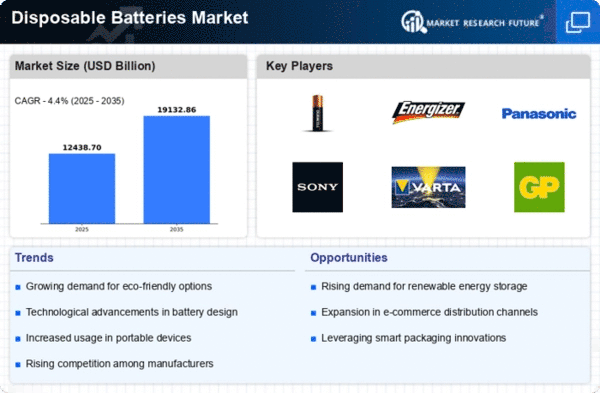Top Industry Leaders in the Disposable Batteries Market
*Disclaimer: List of key companies in no particular order
Top listed companies in the Disposable Batteries industry are:
Duracell Batteries Ltd. (US), Energizer Battery, Inc. (US), Panasonic Corporation (Japan), GP Batteries Intl (Singapore), Everyday Battery Company (US), Rayovac (US), Nbcell Battery (China), Battco (US), Sony (Japan), Southwest Electronic Energy Group (US), and Liebherr Group (Switzerland)
Powering Up: Navigating the Dynamic Landscape of the Disposable Battery Market
Beneath the seemingly mundane hum of everyday gadgets and toys, a hidden battle for portable power rages – the competitive landscape of the disposable battery market. This multi-billion dollar ecosystem crackles with activity, as established giants, agile innovators, and regional specialists vie for a share in powering devices through convenient and readily available single-use batteries. Let's delve into the key strategies, market dynamics, and future trends shaping this energetic space.
Key Player Strategies:
Global Titans: Companies like Duracell, Energizer, and Panasonic leverage their extensive experience, diverse product portfolios, and global reach to maintain their dominance. They cater to major retailers and consumers worldwide, offering reliable and long-lasting disposable batteries for various applications, from everyday devices to demanding industrial uses. Duracell's Platinum Power batteries exemplify their focus on high-performance and extended longevity.
Technology Disruptors: Startups like Litarion and Enovix are disrupting the market with next-generation technologies like lithium-ion and zinc-air disposable batteries. They cater to tech-savvy consumers and niche applications, offering improved energy density, fast charging capabilities, and environmentally friendly options. Litarion's AA lithium batteries showcase their focus on high-powered, long-lasting disposable solutions.
Cost-Effective Challengers: Chinese manufacturers like Rayovac and GP Batteries are making waves with competitively priced disposable batteries, targeting cost-conscious buyers in emerging markets. They focus on affordability and basic functionality, offering alternatives to premium brands. GP Batteries' wide range of affordable batteries exemplifies their focus on cost-sensitive segments.
Niche Specialists: Companies like PowerOne and Saft excel in specific segments like batteries for extreme temperatures, high-drain devices, or medical equipment. They leverage deep understanding of niche requirements and offer tailored solutions with specific performance characteristics. PowerOne's industrial-grade batteries demonstrate their focus on demanding professional applications.
Factors for Market Share Analysis:
Performance and Longevity: Offering batteries with higher energy density, longer service life, and consistent performance across diverse devices is paramount. Companies with reliable and long-lasting solutions gain an edge.
Cost and Affordability: Balancing advanced features with competitive pricing, catering to diverse budget constraints, and offering bulk purchase options play a crucial role in market share analysis. Companies providing cost-effective solutions gain market share.
Environmental Footprint and Sustainability: Utilizing recycled materials in battery production, developing leak-proof designs, and promoting responsible battery disposal and recycling address growing environmental concerns and attract sustainability-conscious customers. Companies leading in green initiatives gain an edge.
Innovation and New Technologies: Investing in research and development of next-generation battery technologies like lithium-ion or rechargeable disposables, offering smart features like battery level indicators, and expanding into high-growth segments like wearables capture market interest and create new opportunities. Companies leading in innovation attract premium pricing and early adopters.
New and Emerging Trends:
Focus on High-Energy-Density and Fast-Charging Solutions: Developing compact batteries with exceptional energy density for demanding devices like portable electronics and gaming consoles, and offering rapid charging capabilities, cater to mobile-first consumers and high-drain applications. Companies pioneering high-density and fast-charging solutions attract tech-savvy customers and premium pricing.
Advancements in Leak-Proof Technology and Safety: Utilizing innovative materials and engineering solutions to prevent leakage and ensure safe battery operation, particularly in sensitive devices like medical equipment, address safety concerns and expand market reach. Companies leading in safety advancements attract tech-conscious consumers and medical device manufacturers.
Integration with Smart Devices and IoT Applications: Developing disposable batteries with communication capabilities for integration into smart devices and Internet of Things (IoT) applications opens up new market opportunities in sectors like home automation and wearable technology. Companies leading in smart battery technology attract early adopters and future-proof their offerings.
Focus on Sustainable Production and Circular Economy: Utilizing recycled materials and implementing closed-loop production processes with efficient recycling programs minimizes environmental impact and caters to growing sustainability demands. Companies leading in green initiatives attract environmentally conscious consumers and regulatory benefits.
Overall Competitive Scenario:
The disposable battery market is a dynamic and complex space with diverse players employing varied strategies. Established giants leverage their reach and diverse portfolios, while technology disruptors introduce innovative solutions. Cost-effective challengers cater to budget-conscious buyers, and niche specialists excel in specific applications. Factors like performance, affordability, environmental impact, and technological innovation play a crucial role in market share analysis. New trends like high-energy-density solutions, leak-proof technology, smart battery integration, and sustainable practices offer exciting growth opportunities. To succeed in this evolving market, players must prioritize innovation, cater to diverse customer needs, embrace sustainable practices, and explore technology-driven solutions. By powering devices in a reliable, affordable, and environmentally responsible manner, they can secure a dominant position in this ever-evolving ecosystem.
Latest Company Updates:
Duracell:
- October 2023: Partnered with TerraCycle to launch battery recycling program in Canada. (Source: Duracell press release)
Energizer:
- November 2023: Announced partnership with Google for smart home battery solutions using Energizer's Ultimate Lithium batteries. (Source: Energizer press release)
GP Batteries:
- December 2023: Launched GP GreenPack recycled battery line, using recycled materials and focusing on sustainability. (Source: GP Batteries website)
Everyday Battery Company:
- December 2023: Partnered with major retail chain to pilot launch of its recyclable zinc-air batteries. (Source: Everyday Battery Company press release)










